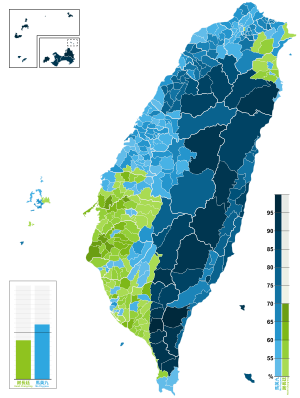
Back 2008 nièng Dṳ̆ng-huà Mìng-guók cūng-tūng sōng-gṳ̄ CDO Präsidentenwahl in der Republik China (Taiwan) 2008 German Elecciones presidenciales de la República de China de 2008 Spanish Élection présidentielle taïwanaise de 2008 French 2008-ngièn Thòi-vân chúng-thúng sién-kí HAK 2008年中華民国総統選挙 Japanese 2008년 중화민국 총통 선거 Korean Taiwanese presidentsverkiezingen 2008 Dutch Wybory prezydenckie w Republice Chińskiej w 2008 roku Polish 2008年中華民國總統選舉 Chinese
| ||||||||||||||||||||
| Registered | 17,321,622 | |||||||||||||||||||
|---|---|---|---|---|---|---|---|---|---|---|---|---|---|---|---|---|---|---|---|---|
| Turnout | 76.33% ( | |||||||||||||||||||
| ||||||||||||||||||||
| ||||||||||||||||||||
 |
|---|
|
|
Presidential elections were held in Taiwan on 22 March 2008.[1][2] Kuomintang (KMT) nominee Ma Ying-jeou won with 58% of the vote, ending eight years of Democratic Progressive Party (DPP) rule. Along with the 2008 legislative election, Ma's landslide victory brought the Kuomintang back to power in the Republic of China.[3][4]
This was the fourth direct election for the President of the Republic of China. The two candidates were Democratic Progressive Party candidate Frank Hsieh and Kuomintang (KMT) nominee Ma Ying-jeou. The KMT ticket was officially formed as of June 23, 2007, with Ma announcing his choice for running mate to be former premier Vincent Siew. The DPP ticket was announced in August, 2007, with Frank Hsieh selecting former Premier Su Tseng-chang. Unlike the 2004 presidential election, the political rhetoric of the campaigns tended to focus on economic issues and government corruption rather than national identity and the political status of Taiwan, with both candidates endorsing the status quo in the short term.[5] But much like previous elections, this election was also marked with island-wide mass rallies and much political mudslinging.
The KMT ticket received a larger percentage and more votes than any other candidate in the previous three direct presidential elections. The election occurred as incumbent President Chen Shui-bian's popularity remained at record lows following mass rallies in September 2006 urging him to resign amid implications of corruption. Amid general economic malaise, as unemployment had risen under Chen's presidency and Taiwan's per capita GDP was surpassed by that of South Korea, Ma won on a platform of economic revitalization and a promise to improve cross-straits relations, in contrast to Chen's confrontational style, as "a peacemaker not a troublemaker".[6] The election occurred in the wake of the KMT's landslide victory in the 2008 legislative elections in which the Pan-Blue Coalition won a three-quarters majority in the Legislative Yuan. On the same day two referendums on joining the United Nations, the first supported by the DPP of President Chen and the second supported by the KMT, failed due to low turnout. Prior to the vote, the KMT had encouraged its supporters to boycott the DPP referendum, and expressed its "understanding" if supporters boycotted both.
- ^ "Central Election Commission:::Presidential Elections:::". Central Election Commission. Retrieved 9 January 2020.
- ^ http://udn.com/NEWS/NATIONAL/NAT1/3918552.shtml [dead link]
- ^ "USC US-China Institute symposium on Taiwanese presidential election". USC US-China Institute. Retrieved August 7, 2011.
- ^ http://www.globalsecurity.org/wmd/library/news/taiwan/2008/taiwan-080322-cna02.htm Decisive election win puts KMT back in power
- ^ Gluck, Caroline (23 March 2008). "Taiwanese hope of new China chapter". BBC News. Archived from the original on 26 March 2008.
- ^ "The Nationalists are back in Taiwan". The Economist. Reuters. 23 March 2008. Archived from the original on 16 November 2018.
© MMXXIII Rich X Search. We shall prevail. All rights reserved. Rich X Search




